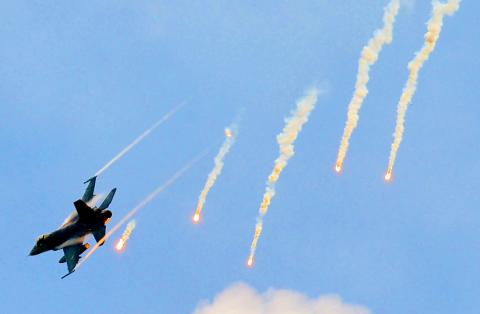|
F-16 pilots came
close to joining US exercise
RED FLAG: While fears of Beijing¡¦s reaction
scuttled the plan, insiders believe that Taiwanese pilots will be able to
eventually participate in the large-scale military exercise
By J. Michael Cole / Staff reporter

An F-16 jet fires tracers during
a live-fire military exercise in Greater Kaohsiung on June 7.
Photo: Chang Chung-yi, Taipei Times
Taiwanese air force pilots came very close
this year to participating for the first time in a highly realistic and
high-intensity combat training exercise in the US, but a last-minute decision by
Washington prevented them from doing so over fears of Beijing¡¦s reaction, a
defense magazine reports in its current issue.
According to the Chinese-language Asia-Pacific Defense Magazine, Taiwanese F-16
pilots were invited to participate in the RED FLAG 12-4 combat exercise held in
July, but after a ¡§careful assessment¡¨ by senior White House officials, the US
side canceled the invitation over fears of China¡¦s reaction and a potential
impact on bilateral ties.
Held at the Nevada Test and Training Range north of Las Vegas, the RED FLAG
combat training exercise, which has been held since 1975, involves air forces
from the US and its allies.
The drills are orchestrated by the US 414th Combat Training Squadron and include
as many as 1,900 possible targets, realistic threat systems and an opposing
¡§enemy force¡¨ that ¡§cannot be replicated anywhere else in the world,¡¨ Nellis Air
Force Base says on its Web site.
The exercise involves command, control, intelligence and electronic warfare, as
well as night missions, and all four branches of the US military take part.
A typical RED FLAG exercise includes fighter, bomber, air superiority,
reconnaissance, electronic warfare as well as airlift aircraft.
Over the years, a number of US allies, including South Korea, Singapore, Sweden,
the UK, Colombia and Saudi Arabia, have taken part, but Taiwan has yet to join.
Taiwanese officials based in the US have been seeking to increase the level of
cooperation between their countries¡¦ armed forces and their efforts were
reportedly behind the decision to invite Taiwan to participate in this year¡¦s
exercise.
The air force has long hopes its F-16 pilots, who have been receiving training
at Luke Air Force Base in Arizona since the 1990s, when Taiwan purchased 146
F-16A/Bs from the US, could participate in RED FLAG to test their skills, learn
joint concepts and gain precious operational experience.
Despite longstanding defense ties between Taiwan and the US, Beijing strongly
opposes joint training between the Taiwanese military and the US or its regional
allies. Nevertheless, US military officers often participate as observers during
military exercises held in Taiwan.
Citing unnamed insiders, the report said that despite the setback, both sides
would continue to work together to secure Taiwan¡¦s participation, adding that
the agencies involved were confident that Taiwanese pilots would eventually be
able to take part.
To compensate for the absence of Taiwanese pilots, the first Tien Lung exercise
was held in Hualien and Taidong from Nov. 10 through Nov. 16, which mirrored the
routines performed during RED FLAG, including a ¡§training acceptance test¡¨
carried out by all the major fighter wings.
The test required all participating wings to draw lots to decide their simulated
enemies before conducting various air combat drills, including day or night
target intercepts, joint air-defense operations, air-to-ground and air-sea
skills against possible tactics employed by the People¡¦s Liberation Army.
These wings worked in coordination with combat control teams, including ground
radar stations and E2K Hawkeye 2000, and air defense units.
In related news, the US Department of Defense announced on Friday that US-based
defense contractor Raytheon Corp on Friday had been awarded a US$289,458,942
contract for Taiwan¡¦s Surveillance Radar Program (SRP), in a contract that is
expected to be completed by Nov. 8, 2017.
Key to Taiwan¡¦s SRP is the US$1 billion-plus long-range early-warning radar that
is being built at Leshan (¼Ö¤s) in Hsinchu County and which is expected to become
operational before the end of this year.
The program drew criticism by some legislators earlier this year after Raytheon
requested an additional NT$4 billion (US$137.6 million) for further
research-and-development and other associated costs.
Once it becomes operational, the radar ¡X deemed the most powerful on the face of
the planet ¡X will give Taiwan an extra 6-minute warning against incoming Chinese
missiles.
Additional reporting by Stacy Hsu
|
![]()
![]()
![]()